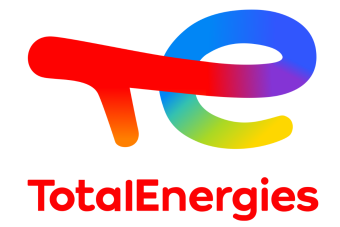Applications for the 2026-2027 Chevron Energy Graduate Fellows Awards Are Now Open
Google Backs UT Energy Institute to Power Texas Energy Innovation and Workforce
As part of their $40 billion investment in Texas, Google is supporting research and training at The University of Texas at Austin related to powering data centers.
About Us
The Energy Institute works to develop innovative, new approaches to solve the world’s greatest energy and climate challenges. It catalyzes and supports new research, cross-disciplinary educational programs and innovation across the 40 Acres and serves as a convener of expertise at The University of Texas at Austin and across the region to enable and lead significant and strategic energy research and education collaboration between academic, community, government, and industry partners.
The Energy Institute helps support UT’s students and over 450 faculty and research staff from UT’s top-ranked programs and centers in engineering, business, geosciences, natural sciences, architecture, law, and public affairs.
Upcoming Energy Opportunities
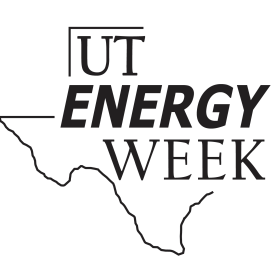
Energy Education at The University of Texas at Austin
The Energy Institute works with schools and departments across campus to foster energy-related courses and energy entrepreneurship. The Institute manages the interdisciplinary Graduate Portfolio Program in Energy Studies; sponsors a weekly guest lecture series, the UT Energy Symposium; and hosts UT Energy Week, an annual gathering of energy experts.
The Energy Institute helps elevate the public conversation about energy issues by connecting journalists with subject matter experts and via energy literacy programs like the podcast Phases and Stages: The Texas Energy Story.
To cultivate energy entrepreneurship across the 40 Acres, the Energy Institute co-created the Smart Energy Call for Innovation (c4i) to support student-led startups and collaborates with Texas Entrepreneurship Exchange for Energy (TEX-E).
Learn More About Energy Education at UT
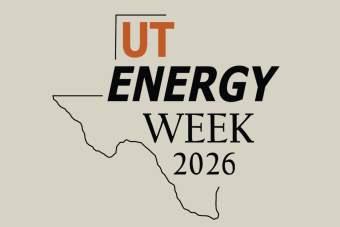
April 6 – April 10, 2026: What Starts Here Energizes the World
Four days of talks and networking with energy leaders to spark dialogue, collaboration, and innovation.
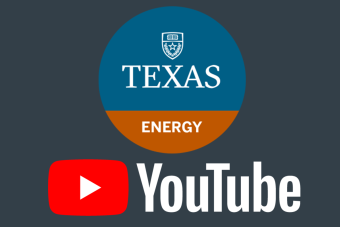
Energy Institute Youtube Channel
A collection of more than 440 recorded lectures from leaders in academia, industry, philanthropy, government, CBO's and NGO’s, on a wide range of topics in energy research, policy, business, education and innovation.

UT Energy Bulletin
Monthly briefing on energy news across campus straight to your inbox.
Resources

UT Energy Bulletin
A monthly e-newsletter recap of all things energy on The University of Texas at Austin campus.

Find an Expert
Energy at UT has more than 400 energy experts contributing to world-class research.
Spotlight
UT Energy Week
Save the date to attend UT Energy Week 2026, April 6 – April 10.
UT Energy Symposium
This weekly class and public lecture series on Tuesdays during the fall/spring semesters features energy sector leaders and experts.
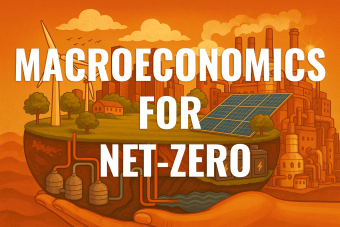
Macroeconomics For Net-Zero
Economics usually lacks the monetary accounting and science to accurately model a net-zero carbon transition. The Cynthia and George Mitchell Foundation is funding a group of scientists and economists to create a new and capable macroeconomics.
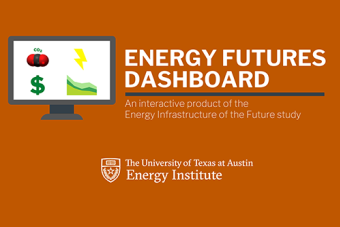
New tool models future energy costs and carbon implications for U.S.
A new online interactive dashboard enables users to understand the costs and impacts of major supplies and demands of energy through the year 2050 across the U.S.

The Energy Institute Welcomes KOSPO as its Newest Industry Partner
Korea Southern Power (KOSPO) has joined a select group of industry, academic, and philanthropic organizations who collaborate with the Energy Institute.
Updates
New Podcast Episode: Phases & Stages Ep. 6 | Alice 'Hub City of South Texas' and an Energy Powerhouse That Once Was
Host Andy Uhler, energy correspondent for NPR's Marketplace, BBC, and KUT's Texas Standard, travels to Alice, Texas, where, after wildcatters struck oil in Jim Wells County in the 1920s, politicians adopted the slogan, “The Hub City of South Texas.” Now that oil and gas is no longer the bread and butter of this town’s economy, can its location once again spur energy investment?
Google Backs UT Energy Institute to Power Texas Energy Innovation and Workforce
As part of their $40 billion investment in Texas, Google is supporting research and training at The University of Texas at Austin related to powering data centers.
Community Archetypes in the Permian Basin and Their Relationship to Energy Resources
The Permian Energy Development Lab (PEDL) has used an archetype approach to build a detailed profile of each Permian county. Using the archetype framework for future studies, PEDL will identify challenges and opportunities associated with participation in the energy transition and propose fitted strategies promoting new economic growth.
UT Expertise to Reduce Emissions from Oil and Gas and Improve Measurement Accuracy
Energy Institute and GTI will lead a collaborative effort to provide training, leak detection and repairs at oil and gas wells and pipelines in the Permian Basin of Texas and New Mexico.
Permian Energy Development Lab (PEDL) Moves Into Round Two in the National Science Foundation (NSF) Regional Innovation Engines Program
PEDL aims to bring significant new investment in innovation and economic development to the Permian Basin, across West Texas and Southeast New Mexico.
DOE Announces Award for up to $1.2 Billion for the Gulf Coast Regional Clean Hydrogen Hub to Bolster America’s Global Clean Energy Competitiveness and Strengthen Our National Energy Security
The University of Texas at Austin will help accelerate the development of the global market for hydrogen and advance secure and sustainable energy in the U.S. and the world. As the lead academic institution and a founding partner in the HyVelocity Hub, UT will provide lifecycle and techno-economic analyses of the projects and lead the Hub's workforce development efforts.
Thanks to Our Corporate Partners and Sponsors







